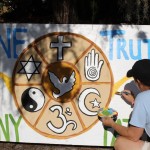I have seen an inordinate amount of holier-than-thou hijinks in my social media feed lately and really needed to revisit some theological touch points that keep me walking on the weird and wonderful Way.
Stomach turning shenanigans like “just pray, pray real hard and trust that God will save you from the sin of homosexuality” or “No matter who wins in 2015 U.S. Election, Lord Jesus is still in charge and in control of the Universe!” are not related, what-so-ever, to the theology of God revealed in Jesus of Nazareth. So much bad/sad theology swirling around that I just had to say a word or three about the notion of God as a transactional tyrant.
See, I have a very hard time with the theology of folk who claim that God gives away touchdowns, Bentleys and control of Congress as rewards for the pious but allows/causes millions of people to suffer from hunger, disease, disasters and diabolical dehumanization. This is not a God worthy of worship. This is not the God revealed to us in the Incarnation.
God is not a cosmic vending machine maniacally squirting out holy snicker bars for the Benhams, Robertsons, Huckabees and Perkins of the world and rancid rat turds for the rest.
A pious and prayerful life will not fill your bank account, provide more touchdowns, win the heart of the hottie you have your eye on, keep your tire from going flat on that dark and rainy night, stop hurricanes or holocausts, prevent homicides or sex trafficking.
The God that Jesus reveals to us is not some mythical old asshat of a man who is “out there” or “up there” to whom we appeal with sacrine supplications to fulfill our self-serving desires or to smite our enemies (though I do love a chance to use the word smite). Neither righteous Job on his stinky, oozy, crusty bed nor Jesus in the garden on the eve of His murder could persuade God to come down to intervene. Even Paul (with whom I am often at odds) recognizes: “For we do not know how we ought to pray; the Spirit “itself” pleads with God for us in groans that words cannot express. And God, who sees in to our hearts, knows what the thought of the Spirit is; because the Spirit pleads with God on behalf of God’s people and in accordance with God’s will.”
Jesus did come to initiate a paradigm shift but it is easy to misunderstand this new way that eschews legalistic, death-dealing religiosity for a liberating faith of abundant grace and life.
So what does the Christian testament about the life of Jesus, the embodiment of God’s heart, teach us about righteousness and suffering? One thing we know through scripture, tradition, reason and experience is that a life of piety, a life lived as near to perfection as possible will not stave off the savage suffering of life or the inevitability of death faced utterly alone.
Barbara Brown Taylor reminds us that “Jesus, so far as we know, is the only perfect human life, lived wholly oriented toward the will of God and his life, suffering and death are hard evidence that: goodness is no protection from pain, Jesus knew every level of pain, emotional, spiritual, and physical unto death.”
A better way to understand the power of prayer (because even in my unbelief, I yet believe) is to wade in the waters trod by Jesus and expand our perception of and relationship with One who is already in the heart of our existence suffering with, creating alongside, nurturing amidst, and midwifing love and compassion.
God is not an omnipotent, coercive or punitive tyrant. God as revealed by Jesus is omnipresent, persuasive, and all loving.
So prayer is (in the words of Brother Lawrence) practicing the presence of God. It is an act of acknowledging our connectedness to God and one another. Prayer is inviting God’s creative presence and offering back to God the radical hospitality of our best selves. Prayer is cooperating with God and living into our interdependence with The Spirit, our neighbors, the environment and even our enemies.
In Bruce Epperly’s book, Process Theology, A Guide for the Perplexed he writes, “Prayer changes things. Prayer does not change God’s love for us or God’s quest for beauty and intensity of experience for us and all creation, our prayers open us and others to greater movements, possibilities and energies of transformation in the God-world relationship, specifically involving those situations for whom we pray.”
Archbishop Desmond Tutu offers that with this vision of God, a God who does not mysteriously eliminate suffering but “bears it with us and strengthens us to bear it” exists a God who shares in our suffering. And just as God shares in our suffering so too do we share in the suffering of one another and are called to care for one another as the agents of transformation that God uses to transfigure God’s world.
I wonder if you might, please oh please, construct and share here a prayer that embodies this vision of God…












